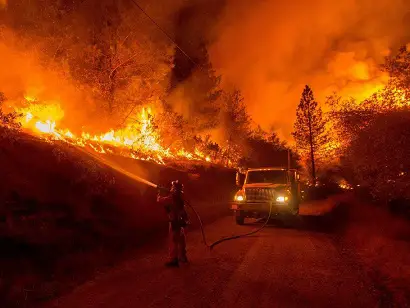As Europe swelters under an unprecedented heatwave, firefighters in London are dealing with a massive surge in fire calls throughout the city.
Sadiq Khan, the mayor of London, said in an interview, “Yesterday was the busiest day for the fire service in London since the Second World War.”
During a normal day, the London Fire Service will receive about 350 calls. On a busy day, they would receive 500 calls. However on Tuesday, they received 2,600 calls. There were 41 properties destroyed by wildfires, and 16 firefighters were injured in the course of their duties.
Khan went on, “It is important for us to recognize that one of the consequences of climate change and these sorts of temperatures that lead to the fires you are seeing. The challenge in London is we have a lot of grass, a lot of green spaces and a lot of that impinges on properties. And when you have not had rain for a long period, when the grass is incredibly dry, fires can start very quickly and spread even faster because of wind and that leads to properties being destroyed.”
Khan continued, “A lot of the problems we have here today are a direct consequence of climate change, excess death because of the heat wave. A lot of these problems can be solved by tackling climate change expediently, rather than kicking the can down the road.”
Firefighters in France, Spain, and Greece are also fighting wildfires, exacerbated by the heat and dry conditions.
Alexandra Naegele, a researcher at the Woodwell Climate Research Center said, “High temperatures and ongoing drought are two primary factors that contribute to wildfire conditions, and southern Europe has had both of those lately. Combined with high wind days, these conditions have resulted in the rapid spread of wildfires across the continent.”
Petteri Taalas, the Secretary General of the World Meteorological Organization said in a statement released Tuesday, “In the future, these kinds of heatwaves are going to be normal. We will see stronger extremes. We have pumped so much carbon dioxide in the atmosphere that the negative trend will continue for decades. We haven’t been able to reduce our emissions globally. I hope that this will be a wake-up call for governments and that it will have an impact on voting behaviors in democratic countries.”
Alyssa Smithmyer, a meteorologist with weather forecasting company, AccuWeather said the high temperatures have been influenced by a meteorological event known as a “heat dome.” She explained, “A heat dome is a term used when a widespread area of high pressure sits over a region or country and lingers for days or even weeks, trapping a very warm air mass beneath it. An area of high pressure will push air to the surface, and this process will warm the air through compression. Due to the influence of the high pressure, there is often minimal chances of precipitation or even clouds as the heat dome lingers over a region. As the high pressure lingers over a region for an extended period of time, temperatures can rise to extreme values. The lack of precipitation or cloud cover will further exacerbate temperatures under these conditions.”
This meteorological process also increases the risks of the formation of harmful ozone pollution. Mark Parrington, a senior scientist from The Copernicus Atmosphere Monitoring Service said, “The potential impacts of very high ozone pollution on human health can be considerable both in terms of respiratory and cardio-vascular illness. Higher values can lead to symptoms such as sore throat, coughing, headache and an increased risk of asthma attacks. The Climate and Clean Air Coalition estimates that ozone pollution causes approximately one million additional deaths per year. This is why it is crucial that we monitor surface ozone levels.”
The safety concerns are exacerbated by the fact fewer than 5% of European homes have air conditioning. Due to a combination of most homes being heated by radiators, without any forced air system present to retrofit an air conditioner’s condenser coil to, and the fact normally cooler temperatures have meant there was no historical need for air conditioning, Europeans never sought to retrofit their homes with it.


